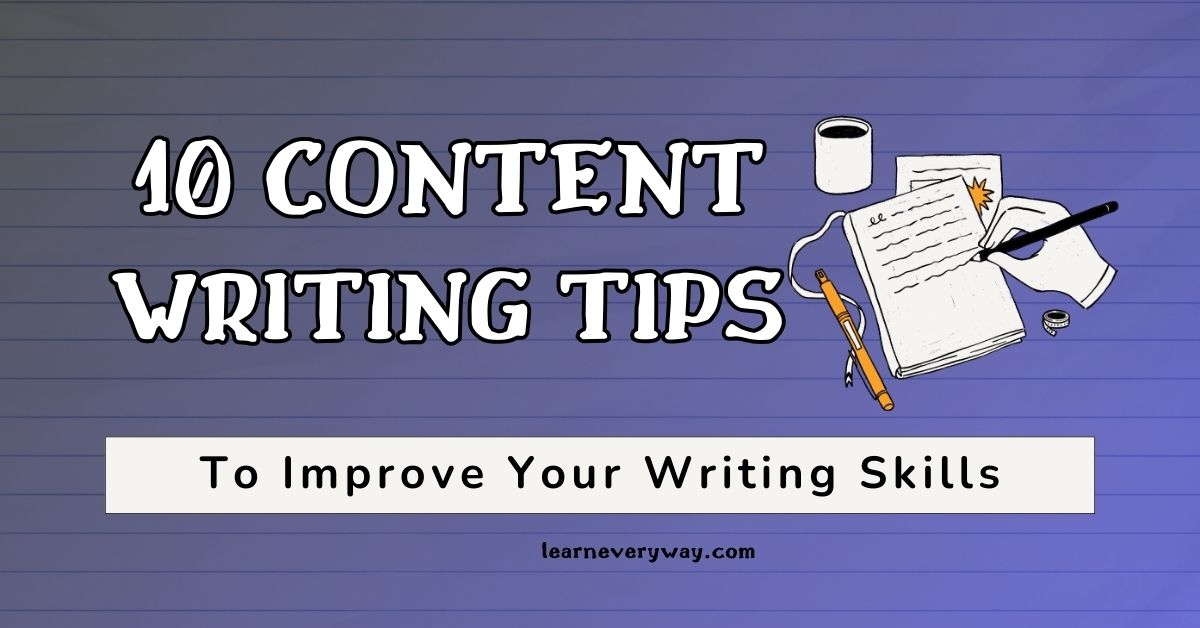Some of the links in this article are affiliate links, which means I may earn a small commission if you sign up or make a purchase through them, at no additional cost to you. Please note that my opinions and experiences are based on my own research and use of the platforms. I only recommend products and services that I believe will be valuable to my readers. Thank you for supporting my work!
A Beginner’s Guide to Ranking Higher
As a content writer, understanding SEO (Search Engine Optimization) is essential if you want your content to be seen and read. SEO helps your content rank higher on search engines like Google, increasing visibility, driving traffic, and improving your chances of attracting new readers or clients. In this article “Mastering SEO for content writers“, I’ll break down SEO for content writers, showing you how to master SEO techniques to improve your writing and get better results.
Learning SEO isn’t as complicated as it may seem, and once you understand the basics, you’ll see how powerful it can be in helping your content succeed. Whether you’re writing blog posts, articles, or web copy, applying SEO principles will make a significant difference.
Why SEO Matters for Content Writers
SEO is the process of optimizing your content to help it rank higher on search engines like Google, Bing, and Yahoo. As a content writer, here’s why SEO is crucial for you:
- Increased Visibility: SEO ensures that your content appears in search results when someone searches for relevant topics. The higher your ranking, the more likely people are to find and read your content.
- Better User Experience: By focusing on SEO, you’re also making your content more user-friendly. Search engines reward content that is easy to navigate, read, and find.
- Higher Traffic: When your content ranks well, it attracts more visitors. More readers = more opportunities to convert those visitors into loyal followers or customers.
- Long-Term Results: SEO doesn’t provide instant results, but over time, it builds momentum. As you consistently apply SEO practices, you’ll notice a steady increase in traffic and engagement.
Step-by-Step Guide to Mastering SEO for Content Writers
1. Understand How Search Engines Work
Before diving into SEO techniques, it’s essential to understand how search engines function. Google, for example, uses an algorithm to rank pages based on factors like relevance, authority, and user experience.
- Crawling: Google sends out bots (called crawlers or spiders) to visit websites and index their pages.
- Ranking: Once Google’s bots have crawled a page, the algorithm evaluates its quality and relevance before ranking it in search results.
- Keywords: Keywords play a major role in helping search engines understand the topic of your content.
2. Conduct Keyword Research
Keyword research is the foundation of SEO. By identifying the words and phrases your audience is searching for, you can optimize your content to rank higher. Here’s how to do keyword research:
- Use Keyword Tools: Tools like Google Keyword Planner (free) or SEMrush can help you find keywords with high search volume and low competition.
- Long-Tail Keywords: Focus on long-tail keywords (phrases that are longer and more specific). They tend to have less competition and attract highly targeted traffic. For example, instead of just “content writing,” try “how to improve content writing skills for beginners.”
- Analyze Search Intent: Understand what people are looking for when they search for a keyword. Are they looking for information, making a purchase, or seeking a service? Tailor your content to meet their needs.
3. Optimize Your Content for Keywords
Once you’ve chosen your target keywords, it’s time to integrate them into your content in a natural way. Keyword stuffing (overusing keywords) can hurt your SEO ranking, so always focus on providing valuable content first.
- Title Tags: Include your main keyword in the title of your content. This is one of the most important SEO factors.
- Meta Descriptions: Write a compelling meta description that includes your main keyword. This snippet appears in search results, so make it attractive to users.
- Headers and Subheadings: Use your keywords in headers and subheadings (H1, H2, H3 tags). This helps search engines understand the structure of your content and its relevance.
- Body Content: Use keywords naturally throughout your article, blog post, or webpage. Avoid overusing them; focus on delivering valuable information.
4. Write High-Quality, Valuable Content
No matter how well you optimize your content, it’s not going to rank if it doesn’t provide value to the reader. Google rewards content that is informative, relevant, and useful to its users. To create high-quality content:
- Answer Questions: Look for questions your audience is asking and provide thorough, well-researched answers.
- Be Original: Avoid copying content from other websites. Original, unique content ranks better and provides more value to readers.
- Keep Content Readable: Use short paragraphs, bullet points, and clear, simple language. Your content should be easy to read and digest.
5. Optimize for Mobile
More and more people are accessing content on mobile devices, so Google prioritizes mobile-friendly websites in its rankings. Ensure that your content is easy to read and navigate on smartphones and tablets:
- Responsive Design: Use a responsive design that automatically adjusts to different screen sizes.
- Fast Loading Speed: Slow websites lose visitors. Compress images and use tools like Google PageSpeed Insights to improve loading times.
6. Build Backlinks
Backlinks are links from other websites to yours, and they play a significant role in improving your SEO. Google views backlinks as a vote of confidence in the quality of your content.
- Guest Blogging: Write guest posts on reputable websites and include links back to your own content.
- Create Shareable Content: Content that is informative, engaging, or entertaining is more likely to be shared and linked to by others.
- Reach Out for Links: If you’ve created high-quality content, don’t be afraid to reach out to other website owners and ask them to link to it.
7. Use Internal Linking
Internal linking (linking to other pages on your website) helps with navigation, boosts your SEO, and encourages readers to explore more content on your site.
- Link Relevant Content: When you mention a topic that has already been covered on your site, link to it. This keeps users on your site longer and helps search engines understand the structure of your content.
- Use Descriptive Anchor Text: Anchor text is the clickable text in a hyperlink. Use descriptive keywords for anchor text, but make sure it reads naturally.
8. Track Your SEO Performance
After optimizing your content, it’s important to track its performance to see how well it’s ranking and where improvements can be made.
- Google Analytics: Use Google Analytics (free) to monitor website traffic, bounce rates, and user engagement.
- Google Search Console: Use Google Search Console to check your site’s performance in search results, monitor backlinks, and identify issues.
Conclusion: SEO is a Skill Every Content Writer Must Master
Mastering SEO is crucial for content writers who want to succeed in the digital world. By learning how to conduct keyword research, optimize your content, and focus on providing value to readers, you can significantly improve your chances of ranking higher on search engines. SEO is not an overnight process, but with consistent effort and the right techniques, you’ll see improvements in your content’s visibility and performance over time.
Resources for Content Writers:
- SEMrush: Use this powerful SEO tool to track keywords and analyze your competition. Start with SEMrush here.
- Google Keyword Planner: Free tool to help you find the best keywords for your content. Use Google Keyword Planner here.
- PageSpeed Insights: Test and improve your website’s loading speed. Try PageSpeed Insights here.
Related blogs to explore:
- Master the art of writing engaging blog posts
- How to become a content writer
- How to write persuasive content writing for conversions
- 10 Content Writing Tips for Beginners to Improve Your Writing Skills
- The Ultimate Guide to Content Writing Tools for Beginners
- How to write engaging content
- How to improve your content writing skills
- How to choose the right niche for content writing
- A Complete Guide to Starting Your Career in Content Writing
FAQs: Mastering SEO for Content Writers
1. What is SEO, and why should content writers care about it?
SEO (Search Engine Optimization) is the process of optimizing your content to rank higher in search engine results. As a content writer, SEO helps your content get noticed by search engines, driving more traffic and increasing visibility.
2. How do I start learning SEO as a content writer?
Start by researching basic SEO concepts, such as keyword research, on-page optimization, and content quality. Tools like Google Keyword Planner and SEMrush are excellent for beginners. Focus on understanding what your audience is searching for.
3. What is keyword research, and how do I do it?
Keyword research helps identify the words and phrases people search for related to your topic. Tools like Google Keyword Planner or SEMrush can help you find keywords with high search volume and low competition, which will make your content more discoverable.
4. How do I optimize my content for SEO?
Optimize your content by using keywords in the title, headers, and body. Focus on creating high-quality, informative content that answers your readers’ questions. Don’t forget to include meta descriptions, optimize images, and use internal and external links.
5. What are long-tail keywords, and why should I use them?
Long-tail keywords are longer, more specific search phrases. They tend to have less competition and attract more targeted traffic. For example, instead of just “content writing,” use “how to improve content writing skills for beginners.”
6. Why is mobile optimization important for SEO?
Since most people access content via mobile devices, Google prioritizes mobile-friendly websites in its rankings. Make sure your website is responsive and that your content is easy to read on smartphones and tablets.
7. What are backlinks, and how can I get them?
Backlinks are links from other websites to yours. They play a significant role in improving SEO. You can build backlinks by guest blogging, creating shareable content, and asking others to link to your high-quality articles.
8. How can I track my SEO performance?
Use tools like Google Analytics and Google Search Console to monitor how your content is performing in search results. These tools give you insights into website traffic, keyword rankings, and more.
9. How long does it take for SEO to show results?
SEO is a long-term strategy. It may take weeks or even months to see significant results, depending on the competition in your niche. Consistent effort will lead to better rankings and more traffic over time.
10. How often should I update my content for SEO?
Regularly updating your content is essential for maintaining high rankings. Search engines prefer fresh, up-to-date content. Aim to review and update your articles every few months to ensure they stay relevant.








Hi,
I liked the way you have explained everything in a way that I read it through the whole content without even losing interest even a single time. Great Job!
Hello Kinza,
Thank you so much! I’m really glad to hear the content held your interest from start to finish, that’s one of the best compliments a writer can receive. I truly appreciate you taking the time to share such encouraging feedback!